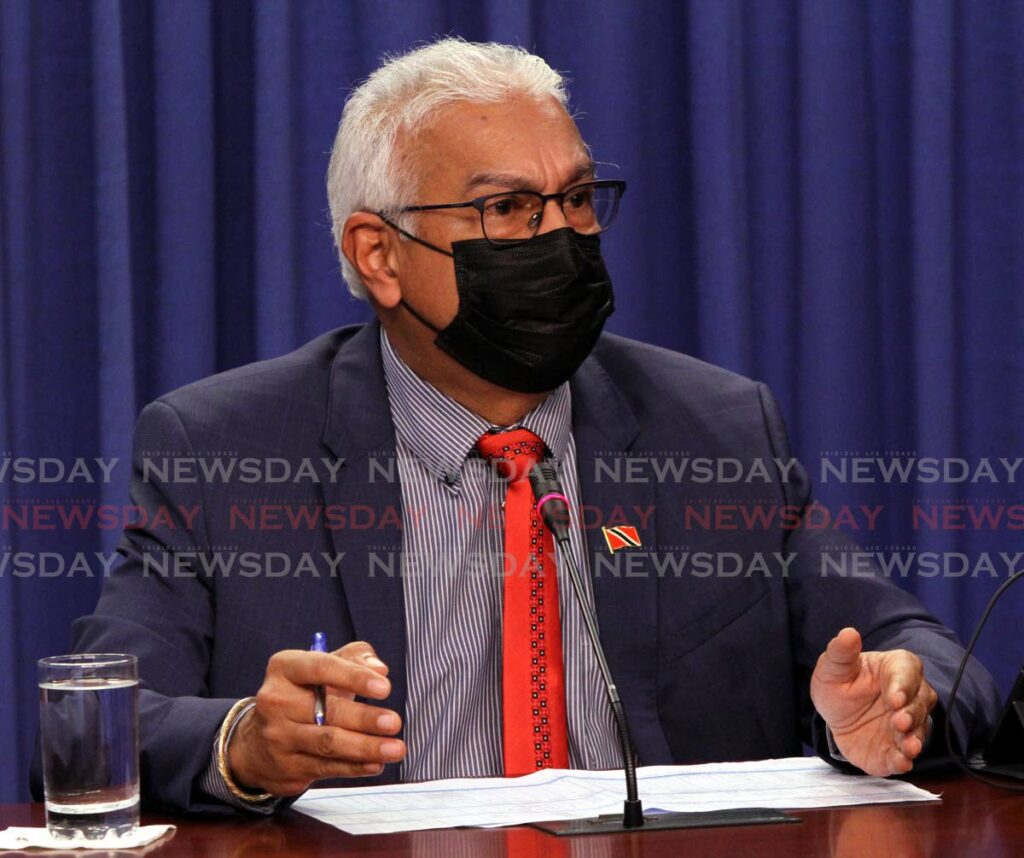National policy launched on intimate-partner and sexual violence

The Ministry of Health, along with its partners the Pan American Organization (PAHO)/World Health Organization (WHO), through the Spotlight Initiative, has launched the first-of-its-kind National Clinical and Policy Guidelines on Intimate Partner Violence (IPV) and Sexual Violence in Trinidad and Tobago.
The Spotlight Initiative is a UN global initiative aimed at eliminating violence against women and girls which is supported by the European Union and other partners.
The launch was held at the Brix, Coblentz Avenue, Port of Spain on March 8.
Bound in hard cover, the 97-page policy says its aim is to “steer the work of healthcare providers (doctors, nurses, social workers and support staff), health and programme managers in various service settings including health centres, district health facilities, hospitals, maternal and child health clinics, family planning, HIV/sexually transmitted infection (STI) and mental health settings.”
Tobago House of Assembly (THA) secretary of Health, Wellness and Social Protection Dr Faith B Yisrael, Spotlight Initiative ambassador Sharon Clarke-Rowley, PAHO/WHO representative Dr Erica Wheeler, Health Minister Terrence Deyalsingh and European Union ambassador Peter Cavendish were among those at the event.
Deyalsingh said, “I think it is a point of reflection in our nation’s history, as it unveils, for the first time, a national clinical guideline policy on intimate-partner violence and sexual violence against women.
“An even more fitting tribute to women is that this launch is occurring today, International Women’s Day.”
The guidelines are intended to improve the capacity of TT’s healthcare providers to respond, holistically, to the physical, mental and social needs of survivors and ensure follow-up care, Deyalsingh said.
He assured B Yisrael that the guidelines would not gather dust, as there was a recent history of developing policy and implementing it. She earlier shared reservations about this issue.
Deyalsingh also addressed the historical bias against women.
“Who is responsible for birth control in the family? Do men take an active role in determining the family size? Do men take an active role in protecting their partners from unwanted pregnancies and STDs?
"The answer is no. We put that onus on the woman,” he said.
He added that even in the field of medicine there was bias against women, citing the story of Australian TV personality Bindi Irwin and her fight with endometriosis.
The bias against women and IPV was not limited to physical spaces but also now extended to the virtual world, with cyberbullying, doxxing (publishing private or identifying information about a particular individual on the internet, typically with malicious intent) and where men – because they feel aggrieved a relationship has gone wrong – release intimate content about a partner, he said.
“Women can find no ease against these ravages,” Deyalsingh said.
It was not only a local problem but also a global one he said, citing the “emotional violence” female gymnasts had experienced at the hands of their coaches and detailed in international media.
Deyalsingh said the guidelines were formulated after about three years of work.
In TT, based on 2017 data, 30 per cent of all women in intimate relationships would have experienced physical or sexual abuse at the hands of their partners, he said. The same survey said one in five women experienced non-partner sexual abuse in her lifetime.
He said the guidelines will be implemented and driven down to the primary healthcare level.
“The mental health burdens imposed on our women as a result of IPV is another issue which must be given consideration.”
Deyalsingh said there would be a week of activities across all health centres and part of it was dedicated to the psycho/social needs of TT’s women.
He said 6,250 domestic violence reports were made to the police from March 2020-March 2022, and the vast majority of those were IPV cases.
He called on people, particularly men, to elevate their consciousness and begin treating women with the respect they deserve.
“Let us start today to write those historical wrongs.”
He commended the Prime Minister for declaring violence a public-health emergency last July.
“We recognise the old solutions don’t fit the new problems. This issue of treating violence as a public-health initiative – the honourable Prime Minister has taken the decision, together with his Caricom colleagues, to elevate it to a Caricom level, because the solutions do not only lie within our limited borders.
“The guns that the men use to threaten women do not come from TT. The guns come from elsewhere. The gun a man uses to murder his wife is not manufactured in TT. It comes from outside.
"So the solutions have to be all-encompassing for the Caribbean.”
Those present were walked through how the policy and resultant system would work and how they were developed. They were also shown how to use the SIP-VAW electronic documentation and health information system. TT was praised for being the first country to do so.
Speaking on further implementation and sustainability, Wheeler said 250 healthcare workers were trained to use the system and 25 of those were trained as trainers. More will also be trained as trainers, she added.
She also said next steps included training workshops with the regional health authorities (RHAs), a special workshop on SIP-VAW and work to strengthen the operability between health and other services.
She said PAHO and the UNDP were collaborating with stakeholders on a project to strengthen the interface between health, police and judicial services. She said this would allow survivors to access care, be safe and protected and have access to justice.


Comments
"National policy launched on intimate-partner and sexual violence"